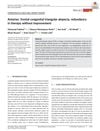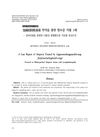 6 citations,
November 2017 in “Dermatologic Therapy”
6 citations,
November 2017 in “Dermatologic Therapy” Combining mometasone furoate cream with adapalene gel is safer and more effective for hair regrowth in alopecia areata than using the cream alone.
 5 citations,
June 2022 in “Frontiers in immunology”
5 citations,
June 2022 in “Frontiers in immunology” Increasing Treg cells in the skin does not cure hair loss from alopecia areata in mice.
 5 citations,
June 2019 in “Open Forum Infectious Diseases”
5 citations,
June 2019 in “Open Forum Infectious Diseases” Six African American women experienced hair loss after switching to a new HIV medication.
 5 citations,
October 2018 in “Dermatologic therapy”
5 citations,
October 2018 in “Dermatologic therapy” Recognizing congenital triangular alopecia is crucial to avoid unnecessary treatments.
 5 citations,
February 2011 in “Expert Opinion on Drug Discovery”
5 citations,
February 2011 in “Expert Opinion on Drug Discovery” We need better treatments for hair loss, and while test-tube methods are helpful, they can't fully replace animal tests for evaluating new hair growth treatments.
 4 citations,
November 2023 in “Frontiers in immunology”
4 citations,
November 2023 in “Frontiers in immunology” New treatments targeting T-cell pathways are needed for better alopecia areata management.
 4 citations,
January 2022 in “Drug design, development and therapy”
4 citations,
January 2022 in “Drug design, development and therapy” Intramuscular corticosteroids are effective and safe for severe alopecia areata, with most patients regrowing hair, but nearly half may relapse.
 4 citations,
January 2020 in “Lasers in Surgery and Medicine”
4 citations,
January 2020 in “Lasers in Surgery and Medicine” Using a 308-nm excimer lamp with minoxidil promotes hair growth in Alopecia Areata patients, especially younger ones or those with smaller bald spots.
 4 citations,
August 2013 in “Case reports in dermatology”
4 citations,
August 2013 in “Case reports in dermatology” A patient with total hair loss developed vitiligo after using a treatment called DCP.
 3 citations,
May 2023 in “Clinical drug investigation”
3 citations,
May 2023 in “Clinical drug investigation” JAK inhibitors for alopecia areata are linked to minor side effects like headache and acne, but not to an increased risk of serious adverse events.
 3 citations,
February 2014 in “The Journal of Korean Medicine Ophthalmology and Otolaryngology and Dermatology”
3 citations,
February 2014 in “The Journal of Korean Medicine Ophthalmology and Otolaryngology and Dermatology” Herbal medicine and acupuncture helped regrow hair and reduce pain in a patient with Alopecia Areata.
 2 citations,
December 2022 in “PNAS nexus”
2 citations,
December 2022 in “PNAS nexus” SCD-153 shows promise as an effective topical treatment for alopecia areata.
 2 citations,
April 2018 in “Journal of Investigative Dermatology”
2 citations,
April 2018 in “Journal of Investigative Dermatology” Frontal fibrosing alopecia shows increased inflammation and JAK-STAT pathway activity without reduced hair proteins.
 2 citations,
January 2017 in “Clinical and medical investigations”
2 citations,
January 2017 in “Clinical and medical investigations” Herbal lotions are effective for severe hair loss, with a 64.8% success rate, but relapse is common and long-term management requires allergen control and possible corticosteroid use.
 2 citations,
March 2013 in “Phytotherapy Research”
2 citations,
March 2013 in “Phytotherapy Research” Ascorbigen increases hair cell growth in a lab setting but does not prevent hair loss from chemotherapy in mice.
 1 citations,
October 2023 in “Dermatology and therapy”
1 citations,
October 2023 in “Dermatology and therapy” Some treatments for severe hair loss work but often have side effects, with baricitinib showing the most promise.
 1 citations,
October 2023 in “International journal of Ayurveda and pharma research”
1 citations,
October 2023 in “International journal of Ayurveda and pharma research” Herbal medications might be safer and more effective for hair loss than synthetic treatments.
 1 citations,
July 2020 in “Bezmialem science”
1 citations,
July 2020 in “Bezmialem science” Reflexology massage helps hair regrowth in women after chemotherapy.
 1 citations,
January 2018 in “Springer eBooks”
1 citations,
January 2018 in “Springer eBooks” The document concludes that scalp cooling and treatments like minoxidil can help manage hair loss from cancer therapy.
 October 2024 in “Journal of Education Health and Sport”
October 2024 in “Journal of Education Health and Sport” Alopecia areata treatment should be personalized, using topical or systemic therapies based on severity, with promising options like JAK inhibitors needing more research.
 August 2024 in “OSMANGAZİ JOURNAL OF MEDICINE”
August 2024 in “OSMANGAZİ JOURNAL OF MEDICINE” The visfatin GT genotype may increase the risk of Alopecia Areata.
 July 2024 in “Regenerative Biomaterials”
July 2024 in “Regenerative Biomaterials” Dissolvable microneedles with Ginsenoside Rg3 can help treat hair loss by improving drug delivery and stimulating hair growth.
 April 2024 in “International Journal of Research Publication and Reviews”
April 2024 in “International Journal of Research Publication and Reviews” Alopecia areata causes hair loss with varied treatment responses and frequent relapses.
 March 2024 in “Journal of pharmacopuncture”
March 2024 in “Journal of pharmacopuncture” Hominis Placenta Pharmacopunture helped regrow hair in a patient with stress-induced hair loss.
 January 2024 in “Archives of dermatological research”
January 2024 in “Archives of dermatological research” Both treatments for alopecia areata showed similar modest effectiveness.
 August 2023 in “International journal of research in dermatology”
August 2023 in “International journal of research in dermatology” Janus kinase inhibitors are effective and generally safe for treating hair loss in adults with alopecia areata.
 April 2023 in “Medizinische Genetik”
April 2023 in “Medizinische Genetik” New research has found 14 genes linked to the risk of developing alopecia areata, improving understanding and treatment options.
 March 2023 in “PARIPEX INDIAN JOURNAL OF RESEARCH”
March 2023 in “PARIPEX INDIAN JOURNAL OF RESEARCH” Tofacitinib helped regrow hair in most patients with severe hair loss.
 April 2022 in “Research Square (Research Square)”
April 2022 in “Research Square (Research Square)” The combination of laser and topical steroids is more effective for treating alopecia areata than topical steroids alone.
 November 2021 in “Austin therapeutics”
November 2021 in “Austin therapeutics” Current treatments for hair loss from chemotherapy are limited, but new methods are being researched.





























